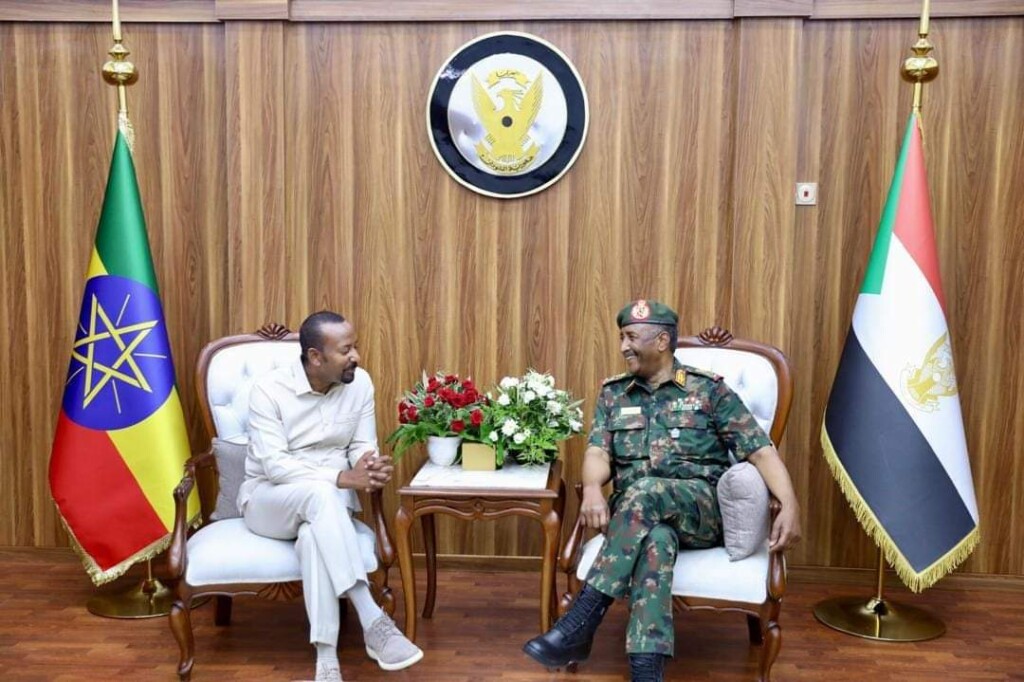Ethiopian PM visits El Burhan to ‘resolve Sudan crisis’

Ethiopian Prime Minister Abiy Ahmed meets Sudanese Sovereignty Council Chairman Lt Gen Abdelfattah El Burhan in Port Sudan, July 9 (Photo: @TayeAtske via X)
Ethiopian Prime Minister Abiy Ahmed’s visit to Port Sudan on Tuesday marked the first time a foreign official of such high rank has visited Sudan since the onset of the ongoing conflict. The visit, which follows a period of strained relations between Ethiopia and Sudan, is part of a broader regional diplomatic effort aimed at resolving the crisis in Sudan.
In a statement following the visit, the Ethiopian Minister of Communication Service Legesse Tulu described the bilateral talks between Abiy Ahmed and the chairperson of Sudan’s Sovereignty Council and commander-in-chief of the Sudanese Armed Forces, Lt Gen Abdelfattah El Burhan, as “fruitful.”
Tulu explained that the primary objective of the visit was to explore peaceful solutions to the conflict, emphasising that the 744-kilometer border shared by Ethiopia and Sudan means that instability in one country can significantly impact the other.
Ethiopian Foreign Minister Taye Atske Selassie met with the European Union’s Special Representative for the Horn of Africa Annette Weber to discuss Sudan’s future in Addis Ababa, yesterday. Ambassador Selassie stated that the PM’s visit proposed a peace plan to El Burhan, who has agreed to consider the proposal. This initiative reportedly reflects Ethiopia’s commitment to fostering dialogue and cooperation in the quest for a “resolution to the Sudanese crisis”.
Geopolitical dynamics
In an interview with Radio Dabanga yesterday, prominent Sudanese researcher and Director of the Sudanese Observatory on Transparency and Policy Suliman Baldo analysed the visit from multiple perspectives. He suggested that the Ethiopian PM’s trip was motivated by a desire to prevent a potential collapse of the Sudanese state and address the refugee crisis that affects both countries.
Baldo argued that the visit serves as a strategic manoeuvre by Ahmed to appear as a regional peacemaker amid Ethiopia’s own internal challenges, including ongoing security confrontations in the Amhara region.
He criticised Ahmed’s visit as a tactic to bolster his image as a peacemaker and regional leader. He pointed to recent domestic initiatives, such as a major reforestation campaign in Ethiopia and symbolic gestures like planting a tree during the Port Sudan visit, as attempts to improve his public image and deflect from internal issues.
The researcher contended that the visiting PM aimed to counter Eritrean influence in Sudan. According to Baldo, Eritrea has been involved in training groups opposed to the Sudanese government, which poses a strategic challenge for Ethiopia. By strengthening ties with El Burhan, Ahmed seeks to neutralise Eritrea’s influence and reaffirm Ethiopia’s role in Sudanese affairs.
Additionally, Baldo pointed out that the visit came shortly after a significant meeting of Sudanese civil and political forces in Cairo aimed at ending the conflict. The Ethiopian PM’s visit, occurring just a day after the Cairo Conference, signals Ethiopia’s intention to remain actively engaged in the Sudanese peace process and prevent Egypt from dominating the diplomatic efforts to resolve the crisis.











 and then
and then